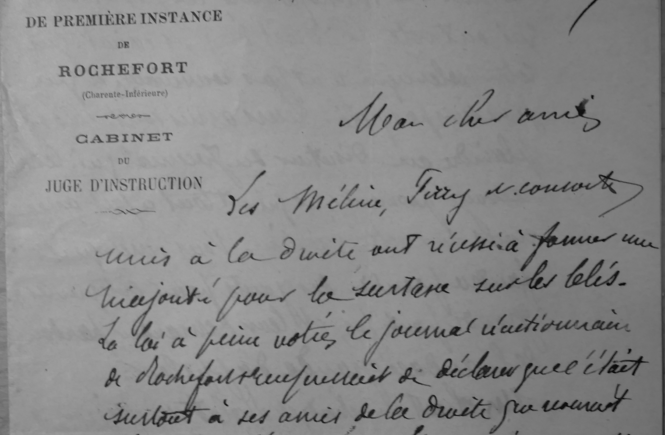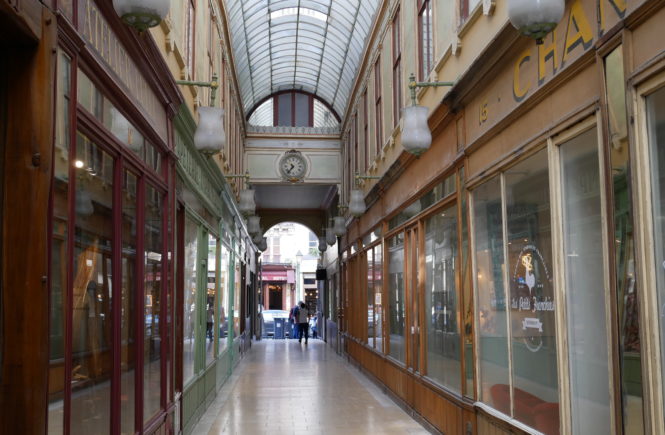Letter from Ernest Martineau to Y. Guyot
16 March 1885
[Archives de Paris, Fonds Guyot, D21J 136.]
Rochefort, 16 March 1885
My dear friend,
Mr. Méline, Ferry and others [1] on the right have managed to form a majority in favor of higher taxes on wheat. [2]
The law had barely been passed that the reactionary newspaper of Rochefort hastened to claim that it was above all his friends on the right who deserved the credit for having taken the initiative of this campaign, thus justifying this word from your colleague Jaurès [3], that the protectionist republicans will be the Georges Dandins of this policy [4].
Can you believe that Delmas and Duchatel [5], our republican deputies from Charente-Inférieure[6], are furious with the debate which took place in Rochefort’s Phare des Charentes, where I dared to speak of the Marquis du Paincher [7]and the hooked fingers of the monopolists? Those gentlemen who voted in favor of the 5 fr. tax cry out that this controversy is inappropriate and that I am not being polite.
Their friends went to the editor of the newspaper to complain about it, but he is entirely with us on this and he turned them away.
As you can see, if we are to criticize the great pontiffs we will need to be cautious, and ask their forgiveness for being bold enough to dare calling things by their name, and Rollet a rascal. [8]
The curious thing is that it is the same people who were absolutely free traders… before the phylloxera [9]; today they burn what they once worshiped, and they cannot forgive me for having ideas and for promoting them.
But let us put aside this topic and these uninteresting politicians. It seems that the idea of creating a League against expensive bread has been put forward. If this is true, it will be very useful, and I believe, and you will certainly agree with me on this, that it should be established on the model of the English league[10]and the League which Bastiat had founded in 1846 [11].
I refused to be part of the Association for the Freedom of Trade [12] founded by Léon Say and his friends because — and I wrote to Mr. de Molinari about it — this association only talks about commercial treaties; it is not based on the fundamental principle of the right to exchange, a consequence of the right to property, which is an absolute right.
This association did not embrace the great motto of the English league: total, immediate and unconditional abolition of the grain laws; thus it will be forever unfruitful.
Why, indeed, have we been beaten? Because of the unawareness of the public regarding the issue: ignorance is therefore the enemy that we have to fight and to defeat, and in this very battle our weapon must be the truth, the only exact and only fruitful principle of the inalienable and imprescriptible right that is the right to exchange.
We must therefore give our league the program of the English league later endorsed by Bastiat.
To place oneself, like Léon Say’s association, on the unstable ground of treaties, on this fallacy [13], as Cobden called it, is to compromise success, it is to accept a hybrid, a transactional system, which cannot impassion the public.
If you agree with me on this, may you come into this league with the program of 1846 and make our views triumph on this fundamental issue.
As for me, I am more than willing to join this campaign. If lectures are to be given, you can count me in. I already wanted to give some in Rochefort. We could organize them in all regions. What do you say?
Yours sincerely,
E. Martineau
____________
[1] Jules Méline (1838-1925) and Jules Ferry (1832-1893).
[2] The law of 9 March 1887, raising the tax from 3 to 5 fr.
[4] Will play the fools in this matter. Martineau is referring to Molière’s George Dandin ou le mari confondu (1668).
[5] Émile Delmas (1834-1898) and Charles Duchatel (1838-1907).
[6] Former name of the département of Charente-Maritime.
[7] Marquis of expensive bread.
[8] « J’appelle un chat un chat, et Rollet un fripon » (Nicolas Boileau, Satires, 1666). Charles Rollet was a prosecutor with a poor reputation.
[9] An insect pest of commercial grapevines, which originated in North America.
[10] The Anti-Corn Law League, founded by Richard Cobden in 1836.
[11] The Association pour la liberté des échanges.
[12] The Association pour la défense de la liberté commerciale, created in 1878.


